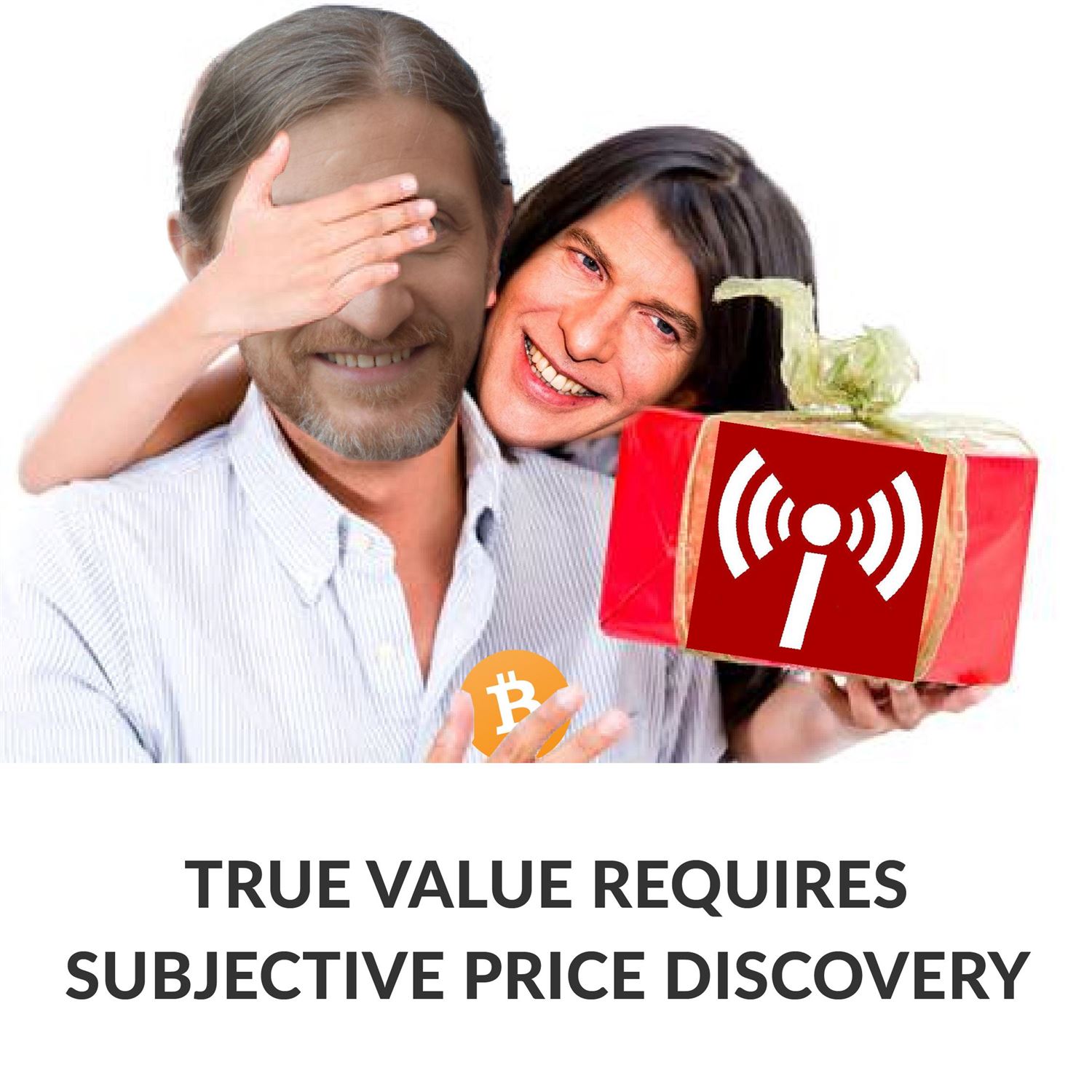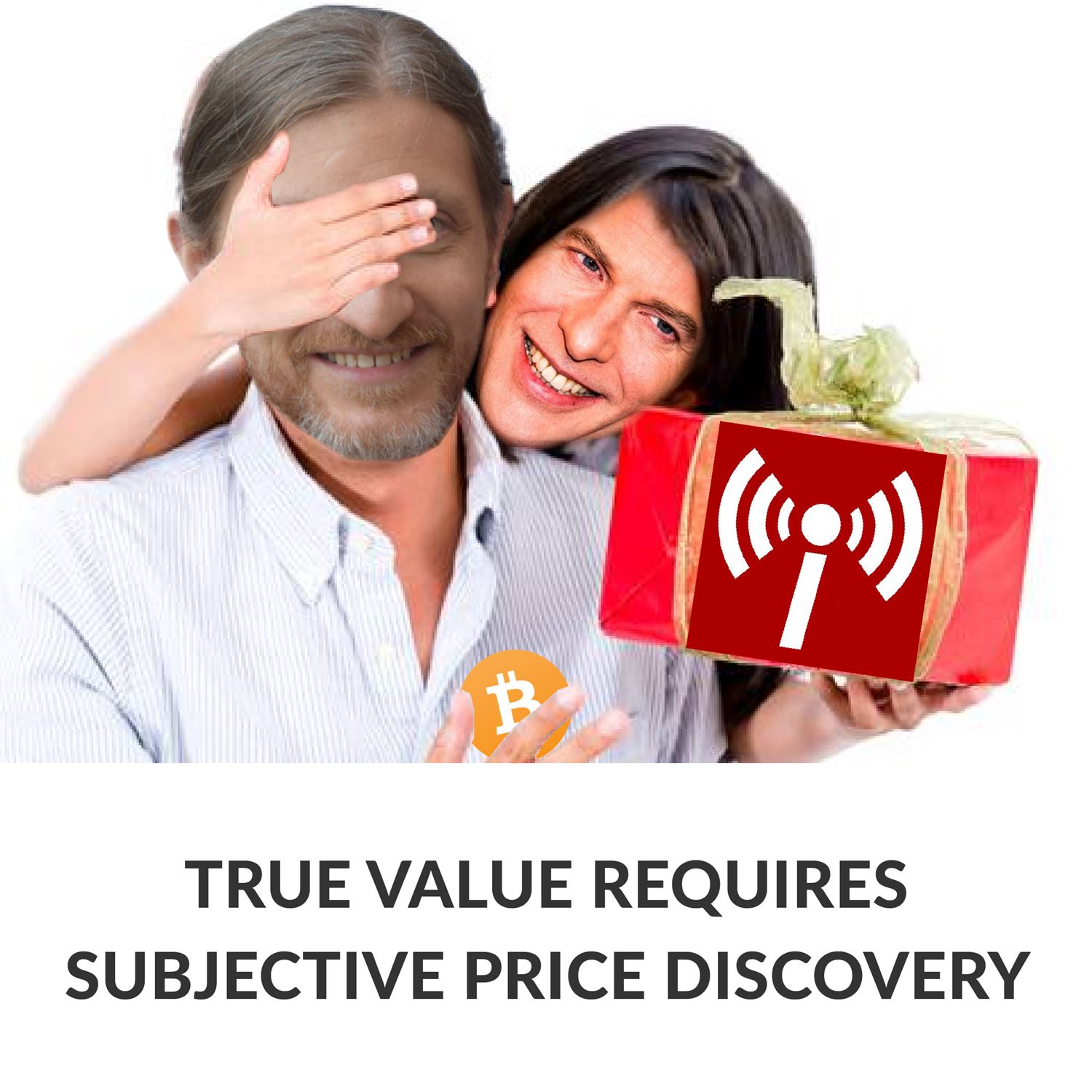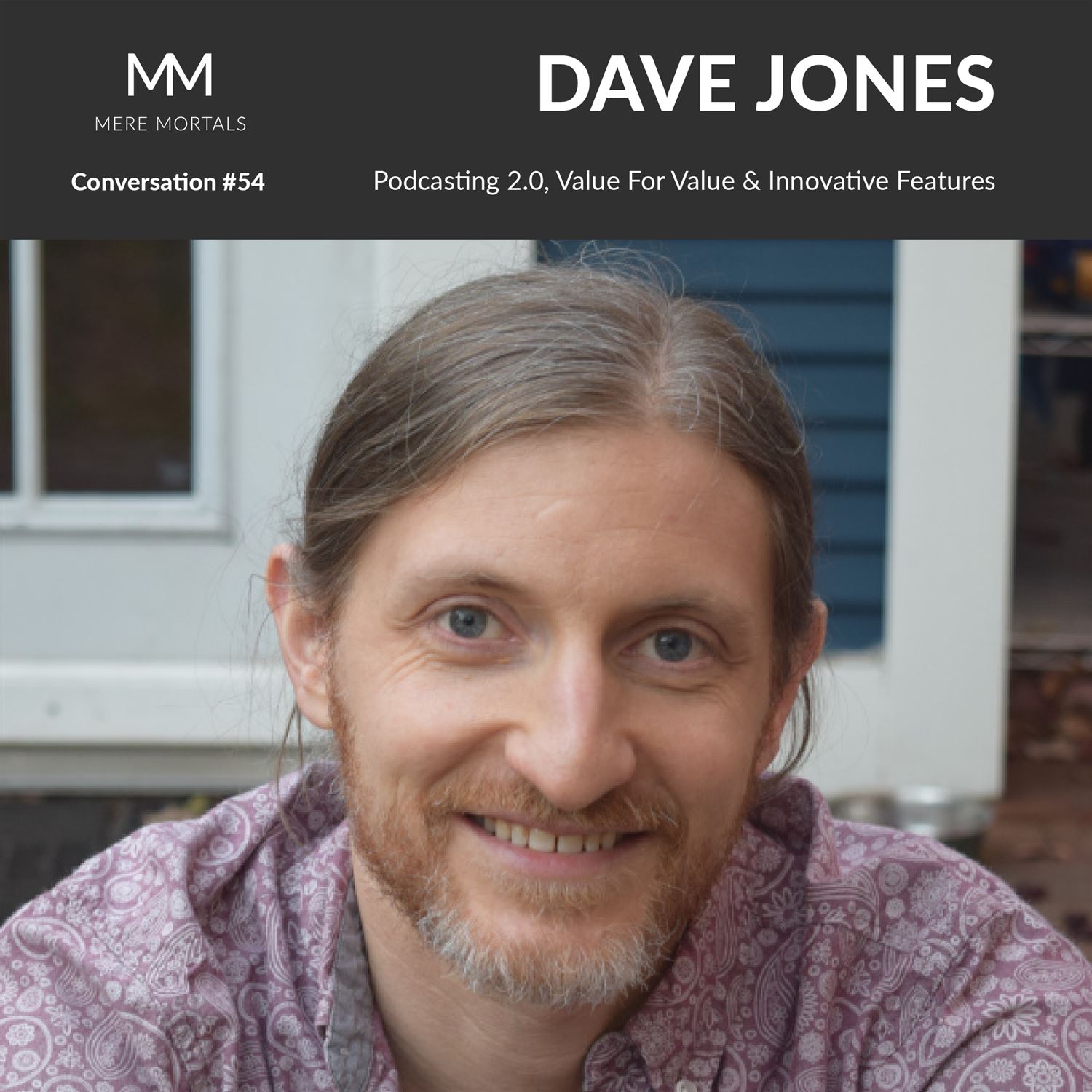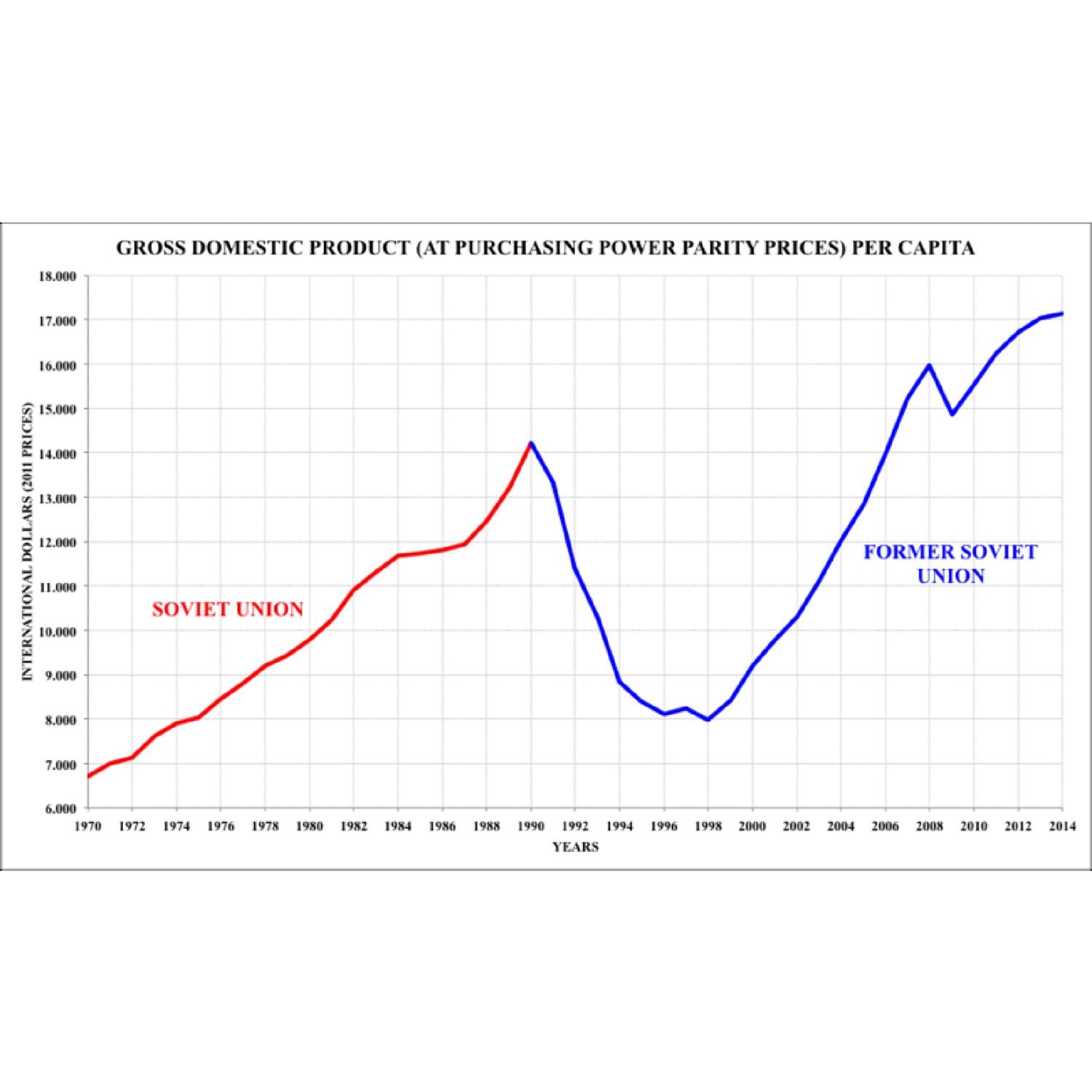What is the true value of something?
In Ep #9 we are exploring the idea of price discovery and how this can be applied to your product, idea, show, podcast, art, etc etc. When you allow someone to choose for themselves the value, you might be surprised at how high they will set that limit (as long as you are asking them to choose and think about it). When limits and artificial restriction in the form of paywalls or mandatory pricing is introduced, this can really distort they way someone will act/feel/think towards you and your creation.
No boostagrams this week, sad puppy :'(
Value 4 Value Support:
Boostagram: https://www.meremortalspodcast.com/support
Paypal: https://www.paypal.com/paypalme/meremortalspodcast
Connect With Kyrin/Mere Mortals:
Website: https://www.meremortalspodcast.com/
Discord: https://discord.gg/jjfq9eGReU
Twitter/X: https://twitter.com/meremortalspods
Instagram: https://www.instagram.com/meremortalspodcasts/
TikTok: https://www.tiktok.com/@meremortalspodcasts
In Ep #9 we are exploring the idea of price discovery and how this can be applied to your product, idea, show, podcast, art, etc etc. When you allow someone to choose for themselves the value, you might be surprised at how high they will set that limit (as long as you are asking them to choose and think about it). When limits and artificial restriction in the form of paywalls or mandatory pricing is introduced, this can really distort they way someone will act/feel/think towards you and your creation.
No boostagrams this week, sad puppy :'(
Value 4 Value Support:
Boostagram: https://www.meremortalspodcast.com/support
Paypal: https://www.paypal.com/paypalme/meremortalspodcast
Connect With Kyrin/Mere Mortals:
Website: https://www.meremortalspodcast.com/
Discord: https://discord.gg/jjfq9eGReU
Twitter/X: https://twitter.com/meremortalspods
Instagram: https://www.instagram.com/meremortalspodcasts/
TikTok: https://www.tiktok.com/@meremortalspodcasts
[00:00:01]
Unknown:
Hey, Hey, and welcome to another episode of the value for value Podcast, the podcast for those wanting to understand the value for value model. My name is Kyrin and I'm a podcaster, here in sunny old Brisbane, Queensland, Australia. And I myself am on the journey of trying to understand the value for value model and how I as a podcaster, can introduce this into my podcasts and make this a long term long effect, engagement with my audience and be able to connect with them in different ways and get value from them in different ways and give value to them in different ways. So lots of fun things going on. In episode nine, it is called True Value requires subjective price discovery. So what is price discovery? And when is it an option? So this is a interesting topic, because I suppose I'm going to go into how you can use the price discovery mechanism of your audience to get them to really truly judge what they think of the show and how they would value it essentially. Now, obviously, this can't work for everyone. So some companies need steady revenue, for example. But what if you don't need that, so let's put yourself in my position here. I'm a podcaster.
Just doing it all on my own, I do my own audio editing, the videos, the production, everything's on me. And so I have no need, in particular for quick cash or money grabs or anything like that. And I really want to just let my own audience discover, hey, what do you think of the mere mortals podcast, for example, my, my main channel and get them to decide what they think of that. So a question is, what is the true value of something? And well, I think the answer this is relatively easy, it's whatever people decided as worth. So that's what the true value is. Now, this can be looked at the form from a group perspective, ie, a company is, has a market cap of x billion dollars. And you could say, okay, yeah, that's the true value from a group perspective, that is the input a single number on that, hey, that's what it is worth. But when you think about this, this is made up of very many small individual valuations by the people holding the stock of the company. And each one of them in the open market forms that that larger valuation, but it's really each person deciding you know, what, I think it is worth $2 per share, I think it is worth this much per share. And that's why you will buy it and hold it for certain periods. Or you might be using it for day trading, whatever it is, each person decides. And I think this is really applicable to music, art, each individual episode, a blog post, for example. So I could have someone look at this and each individual episode and say, You know what, I think this is worth this, I think this is worth that. Now, this could be worth nothing. And you could actually hate it. That's totally fine. Or you could think, you know what, this was really good.
I wish I could give back to this. And so I'm going to play a little clip now. And this is from Dave Jones when I had him on the mere mortals podcast, which was on Episode Oh, 50, something I can't remember all it'll be appear on your screen right now, if you're in a good podcasting app. And now Dave, has some great ideas on the value for value model. And he was the one who actually made me thinking about this price discovery and why it can be so subjective. So here's a little clip from Mr. Dave Jones. And then you're not setting the price. You're letting the listener set the price, because everybody's value, everybody's value judgments are subjective. You know, I can really love this show. The guy next to me might not like it at all. And there's everything in between on that spectrum. So you know, if you limit and say, Okay, you can subscribe to my show, but it's gonna cost you $5 a month. Well, what about the guy that would have given you $500 a month, that guy is now artificially restricted to only give you five? So anyway, that's the value for value model itself, you know. And then what we did with podcasting, 2.0 is bring the technology and to make it meet a payable within the player and all that stuff.
So there we have it, everybody's value judgments are subjective. I really like looking into the language that people use sometimes and see what that can give an indication of and you'll notice he said some things like limits and artificial restriction. And I'm going to tie this to something a little bit out of left field, so just bear with me here, but I really like diving into history and especially if you've read much of the USSR, you'll notice that well, there was a whole lot of reasons why that regime collapsed, I guess, but one of them and maybe the core reason was simply economical, it couldn't handle the weight of its own bloatedness of The inefficiencies that were going on, then this was a lot related to communism and the practice of capping prices and putting prices on things and doing that from the top, and then going down. So this is the government saying, hey, this, the price of wheat is going to be this much for everywhere in the country, it's going to be worth this in Ukraine, it's going to be worth this in Russia, it's going to be worth this in Georgia, you know, all sorts of different places. And I think one of the reasons that this was a really bad idea was just that, that altering the price, in this sense, is, is restricting people because they can't value things the way it should be. So if it's incredibly difficult to produce wheat in Ukraine, and it's super easy in Georgia, like it makes no sense that it should be have the same dollar value to it. And then this is why generally, the free market is a better idea, because then everyone gets to put their own price on things. And then the market can sort of decide, okay, this works this way, etc, etc. And generally using that model, that model, everyone gets wealthier. And so I think when you're just using artificial restriction on people, and their judgments, and how they decide how they want to do things, yes, that can lead to weird judgments and obviously, not producing the net wealth of everyone going up. And you can have certain people getting extremely wealthy, which still happens in capitalism, but the sort of like a rising tide lifts all boats sort of thing rather than in communism, that it's the the pie doesn't expand with the with the system itself. So a little bit of a digression there a little bit history. But when you start to think of something like this, you can say, Okay, but how does that apply to my podcast, for example, like, people making individual decisions? How can I restrict that, for example?
Well, Dave mentioned that just then you can put a cap on each episode or a paywall, and say, hey, you need $5 to access this. And the thing with that is, you're always only going to get people going up to that point. So you're going to get those people who say, Yeah, you know what, that's, that's worth it. And they probably be even going to say, I would have even paid $6 for that. And but they can't, because it's restricted at five. And then for everyone else under that, well, obviously, they're not going to meet the benchmark of five, so they'll won't join that. So you can make it five, but maybe some people would pay 500. And then once again, you're asking, Okay, that's, that's okay. But you know, who's gonna pay 500 for my podcast? Well, the good thing with this is we have the example of Adam curry on his show with no agenda also with Dvorak is also on that show. And he's proved this, he's proved, hey, you can actually if you produce enough quality in your show, if you're consistent enough, and you ask people, you can actually get people donating large sums of money to you. And so you're like, oh, five, $50?
That's nice. 500? Well, that's pretty cool. I believe recently, he even had a single donation of 5000, which is just, like ridiculous, it's, it's ridiculous that someone would send that amount. And look, honestly, the the amounts for you at this stage, whoever you are, is, is probably going to be small, and you know, sort of inconsequential in a way. But with time, and with practice, and with energy, you can hopefully build that up and make that into something sustainable. So, you know, doing a podcast for free all the time. Depends how much time and effort you put into it, of course, but that isn't fully sustainable. And you will have to look at some way of, of keeping your head afloat, because obviously, when you're doing things, and if you're putting value out into the world, you do expect some of that to come back. So I feel in the end, you have to decide and if it's not you, then you're either getting overcharged. So I if you're you have this paywall I really liked the show, but man, I'd really don't like it at $10 a month, but alright, I guess I'll pay. That's when you you could have some sort of resentment there. So I would even argue most people won't do that. But you know, there might be a couple who jump up to that, that $10 limit, but they'll probably feel a little bit something of like, you know, do I really want this. And then obviously, you've capping it with the others because you're saying to them, Hey, this show can only be worth $10 for you. And they might be going oh, you know, it's only worth $10 To me, this this show used to be good in my mind. And so, I think it can be slightly distorting about how you feel think and act towards that object idea or what product whatever it is that you you have in your head about that thing. So I definitely am more of an advocate for the subject of price discovery, if I can choose how much I want to donate to something called give to something or buy this product.
You know, I would prefer myself obviously to, to be able to choose that. Now, obviously, this has to be taken into consideration with where it's coming. Once again, I can't buy a TV for $1 Just because I want it to be $1. That doesn't work that way. But in the terms of this world of podcasting of art creation of doing something independently, or you know, maybe even a small group, maybe the subject of price discovery value for value model is the way to go for you. So that is my little thoughts on that. Now normally, this is the time for the boostagram corner and I was going to play one of the jingles that Adam curry actually created for me on his podcasting 2.0 show when I sent some value his way and asked him for it.
Unfortunately, there's no boostagrams this week, sad puppy noises weren't weren't well, so my boostagram corner, my boostagram lounge for this week is actually going to be, hey, send me a boostagram, and then you'll get to hear that jingle. So I really do enjoy the the boostagrams, once again, for the value amount. Yeah, you know, that's nice, but more, it's the interaction because you can get some really fun, different discussions that are more related to your podcast episode. And if you really want to examine this, go check out the mere mortals, meanderings episodes, where we read out our boostagrams, and you can see just how much of a difference it can make in terms of the interactiveness and the quality and ideas that come out of the show. So that is my little boostagram lounge for this week. And a tip as always, to end off with or a recommendation or suggestion. And I'd like you to have a think about some areas where your love has maybe gone away for something. So maybe you really enjoyed some music that you were listening to on iTunes, and then you know, you were forced to pay $1 A Song for it or whatever the amount is, it's been a while since I've actually used iTunes. And maybe that's been distorted because you are paying an amount that is either too much or too less. And you know, you maybe you should have a look at some of those things. And I'd encourage you, and if you're listening as a podcaster, or artists, creator, whatever, encourage your listener to value the show, however they want to and so give them that option to do that. Dave mentioned right at the end that they have worked on the technology to do this. So this is using the value for value apps. So if you go to new podcast apps.com You can find some of these and look under the Value tab. I'll list some of them off the top of my head we have breeze curio caster pod friend fountain FM cost ematic.
Paul pod verse, I believe even does that now so there's a couple for you right there. Our pod station if you're really interested in in doing this, you can do that via the desktop or a Chrome extension at add on. So lots of cool ways. Lots of cool ways for microtransactions and this new world of the podcasting 2.0 value for value and introducing the ability for you to have true value coming in for what people actually think of your show of your product of what it is you're creating. And yeah, it's a fun world and I encourage you to jump in. So that is it for today. Kyrin signing out
Hey, Hey, and welcome to another episode of the value for value Podcast, the podcast for those wanting to understand the value for value model. My name is Kyrin and I'm a podcaster, here in sunny old Brisbane, Queensland, Australia. And I myself am on the journey of trying to understand the value for value model and how I as a podcaster, can introduce this into my podcasts and make this a long term long effect, engagement with my audience and be able to connect with them in different ways and get value from them in different ways and give value to them in different ways. So lots of fun things going on. In episode nine, it is called True Value requires subjective price discovery. So what is price discovery? And when is it an option? So this is a interesting topic, because I suppose I'm going to go into how you can use the price discovery mechanism of your audience to get them to really truly judge what they think of the show and how they would value it essentially. Now, obviously, this can't work for everyone. So some companies need steady revenue, for example. But what if you don't need that, so let's put yourself in my position here. I'm a podcaster.
Just doing it all on my own, I do my own audio editing, the videos, the production, everything's on me. And so I have no need, in particular for quick cash or money grabs or anything like that. And I really want to just let my own audience discover, hey, what do you think of the mere mortals podcast, for example, my, my main channel and get them to decide what they think of that. So a question is, what is the true value of something? And well, I think the answer this is relatively easy, it's whatever people decided as worth. So that's what the true value is. Now, this can be looked at the form from a group perspective, ie, a company is, has a market cap of x billion dollars. And you could say, okay, yeah, that's the true value from a group perspective, that is the input a single number on that, hey, that's what it is worth. But when you think about this, this is made up of very many small individual valuations by the people holding the stock of the company. And each one of them in the open market forms that that larger valuation, but it's really each person deciding you know, what, I think it is worth $2 per share, I think it is worth this much per share. And that's why you will buy it and hold it for certain periods. Or you might be using it for day trading, whatever it is, each person decides. And I think this is really applicable to music, art, each individual episode, a blog post, for example. So I could have someone look at this and each individual episode and say, You know what, I think this is worth this, I think this is worth that. Now, this could be worth nothing. And you could actually hate it. That's totally fine. Or you could think, you know what, this was really good.
I wish I could give back to this. And so I'm going to play a little clip now. And this is from Dave Jones when I had him on the mere mortals podcast, which was on Episode Oh, 50, something I can't remember all it'll be appear on your screen right now, if you're in a good podcasting app. And now Dave, has some great ideas on the value for value model. And he was the one who actually made me thinking about this price discovery and why it can be so subjective. So here's a little clip from Mr. Dave Jones. And then you're not setting the price. You're letting the listener set the price, because everybody's value, everybody's value judgments are subjective. You know, I can really love this show. The guy next to me might not like it at all. And there's everything in between on that spectrum. So you know, if you limit and say, Okay, you can subscribe to my show, but it's gonna cost you $5 a month. Well, what about the guy that would have given you $500 a month, that guy is now artificially restricted to only give you five? So anyway, that's the value for value model itself, you know. And then what we did with podcasting, 2.0 is bring the technology and to make it meet a payable within the player and all that stuff.
So there we have it, everybody's value judgments are subjective. I really like looking into the language that people use sometimes and see what that can give an indication of and you'll notice he said some things like limits and artificial restriction. And I'm going to tie this to something a little bit out of left field, so just bear with me here, but I really like diving into history and especially if you've read much of the USSR, you'll notice that well, there was a whole lot of reasons why that regime collapsed, I guess, but one of them and maybe the core reason was simply economical, it couldn't handle the weight of its own bloatedness of The inefficiencies that were going on, then this was a lot related to communism and the practice of capping prices and putting prices on things and doing that from the top, and then going down. So this is the government saying, hey, this, the price of wheat is going to be this much for everywhere in the country, it's going to be worth this in Ukraine, it's going to be worth this in Russia, it's going to be worth this in Georgia, you know, all sorts of different places. And I think one of the reasons that this was a really bad idea was just that, that altering the price, in this sense, is, is restricting people because they can't value things the way it should be. So if it's incredibly difficult to produce wheat in Ukraine, and it's super easy in Georgia, like it makes no sense that it should be have the same dollar value to it. And then this is why generally, the free market is a better idea, because then everyone gets to put their own price on things. And then the market can sort of decide, okay, this works this way, etc, etc. And generally using that model, that model, everyone gets wealthier. And so I think when you're just using artificial restriction on people, and their judgments, and how they decide how they want to do things, yes, that can lead to weird judgments and obviously, not producing the net wealth of everyone going up. And you can have certain people getting extremely wealthy, which still happens in capitalism, but the sort of like a rising tide lifts all boats sort of thing rather than in communism, that it's the the pie doesn't expand with the with the system itself. So a little bit of a digression there a little bit history. But when you start to think of something like this, you can say, Okay, but how does that apply to my podcast, for example, like, people making individual decisions? How can I restrict that, for example?
Well, Dave mentioned that just then you can put a cap on each episode or a paywall, and say, hey, you need $5 to access this. And the thing with that is, you're always only going to get people going up to that point. So you're going to get those people who say, Yeah, you know what, that's, that's worth it. And they probably be even going to say, I would have even paid $6 for that. And but they can't, because it's restricted at five. And then for everyone else under that, well, obviously, they're not going to meet the benchmark of five, so they'll won't join that. So you can make it five, but maybe some people would pay 500. And then once again, you're asking, Okay, that's, that's okay. But you know, who's gonna pay 500 for my podcast? Well, the good thing with this is we have the example of Adam curry on his show with no agenda also with Dvorak is also on that show. And he's proved this, he's proved, hey, you can actually if you produce enough quality in your show, if you're consistent enough, and you ask people, you can actually get people donating large sums of money to you. And so you're like, oh, five, $50?
That's nice. 500? Well, that's pretty cool. I believe recently, he even had a single donation of 5000, which is just, like ridiculous, it's, it's ridiculous that someone would send that amount. And look, honestly, the the amounts for you at this stage, whoever you are, is, is probably going to be small, and you know, sort of inconsequential in a way. But with time, and with practice, and with energy, you can hopefully build that up and make that into something sustainable. So, you know, doing a podcast for free all the time. Depends how much time and effort you put into it, of course, but that isn't fully sustainable. And you will have to look at some way of, of keeping your head afloat, because obviously, when you're doing things, and if you're putting value out into the world, you do expect some of that to come back. So I feel in the end, you have to decide and if it's not you, then you're either getting overcharged. So I if you're you have this paywall I really liked the show, but man, I'd really don't like it at $10 a month, but alright, I guess I'll pay. That's when you you could have some sort of resentment there. So I would even argue most people won't do that. But you know, there might be a couple who jump up to that, that $10 limit, but they'll probably feel a little bit something of like, you know, do I really want this. And then obviously, you've capping it with the others because you're saying to them, Hey, this show can only be worth $10 for you. And they might be going oh, you know, it's only worth $10 To me, this this show used to be good in my mind. And so, I think it can be slightly distorting about how you feel think and act towards that object idea or what product whatever it is that you you have in your head about that thing. So I definitely am more of an advocate for the subject of price discovery, if I can choose how much I want to donate to something called give to something or buy this product.
You know, I would prefer myself obviously to, to be able to choose that. Now, obviously, this has to be taken into consideration with where it's coming. Once again, I can't buy a TV for $1 Just because I want it to be $1. That doesn't work that way. But in the terms of this world of podcasting of art creation of doing something independently, or you know, maybe even a small group, maybe the subject of price discovery value for value model is the way to go for you. So that is my little thoughts on that. Now normally, this is the time for the boostagram corner and I was going to play one of the jingles that Adam curry actually created for me on his podcasting 2.0 show when I sent some value his way and asked him for it.
Unfortunately, there's no boostagrams this week, sad puppy noises weren't weren't well, so my boostagram corner, my boostagram lounge for this week is actually going to be, hey, send me a boostagram, and then you'll get to hear that jingle. So I really do enjoy the the boostagrams, once again, for the value amount. Yeah, you know, that's nice, but more, it's the interaction because you can get some really fun, different discussions that are more related to your podcast episode. And if you really want to examine this, go check out the mere mortals, meanderings episodes, where we read out our boostagrams, and you can see just how much of a difference it can make in terms of the interactiveness and the quality and ideas that come out of the show. So that is my little boostagram lounge for this week. And a tip as always, to end off with or a recommendation or suggestion. And I'd like you to have a think about some areas where your love has maybe gone away for something. So maybe you really enjoyed some music that you were listening to on iTunes, and then you know, you were forced to pay $1 A Song for it or whatever the amount is, it's been a while since I've actually used iTunes. And maybe that's been distorted because you are paying an amount that is either too much or too less. And you know, you maybe you should have a look at some of those things. And I'd encourage you, and if you're listening as a podcaster, or artists, creator, whatever, encourage your listener to value the show, however they want to and so give them that option to do that. Dave mentioned right at the end that they have worked on the technology to do this. So this is using the value for value apps. So if you go to new podcast apps.com You can find some of these and look under the Value tab. I'll list some of them off the top of my head we have breeze curio caster pod friend fountain FM cost ematic.
Paul pod verse, I believe even does that now so there's a couple for you right there. Our pod station if you're really interested in in doing this, you can do that via the desktop or a Chrome extension at add on. So lots of cool ways. Lots of cool ways for microtransactions and this new world of the podcasting 2.0 value for value and introducing the ability for you to have true value coming in for what people actually think of your show of your product of what it is you're creating. And yeah, it's a fun world and I encourage you to jump in. So that is it for today. Kyrin signing out







